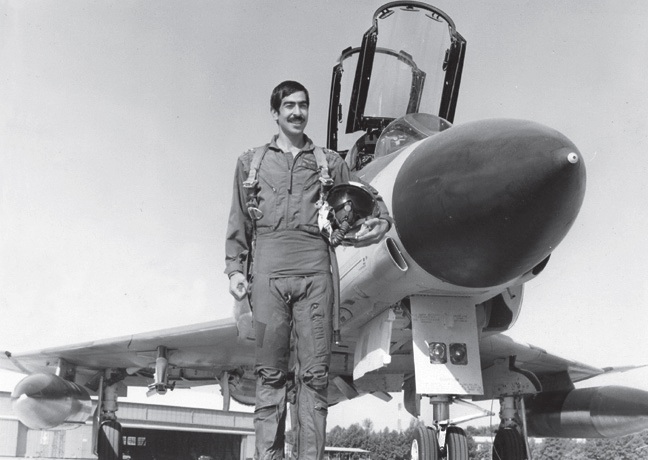Air Raid to Al-Waleed (11)
The Story of Demolishing Fighters and the Equipment in Al-Waleed Triple Military Bases Known as H-3
2016-3-6
Air Raid to Al-Waleed (H-3)
The Story of Demolishing Fighters and the Equipment in Al-Waleed Triple Military Bases Known as H-3
By: Brigadier General Ahmad Mehrnia
Tehran, Sooreh Mehr Publications Company
2010 (Persian Version)
Translated by: Zahra Hosseinian
At those days, weather system was not developed and integrated like today, and wrong forecasts would happen. Today seems to be one of these days. Two tankers and ten bombers arrive to the predetermined place on the margins of the south of Lake Uremia. A thick cloud covered the overhead of flight group. Retired pilot, Colonel Fereidounzadeh says:
“From near the Zanjan, it clouded. As we would approach to the Lake Uremia, the clouds would more thicken and darken. We never would deliver fuel in this weather, but it had been emphasized so much about the importance of this mission that we successfully refueled on schedule, despite the bad weather and acceptance the risks associated with it and no problem occurred in this regard.”

Four F-4 (Phantom) is approaching to Boeing-707 in cloudy weather to refuel
But Capt. Luther Yadegari, who was the leader of two tankers in the mission, says:
“For two reasons the memory of this flight always been in my mind: first, severe rainfall and low height for refueling; and second, shooting of insider forces to our aircrafts.”
He complained about it and said:
“Location of delivering fuel was over Lake Uremia. Whenever we would approach to the Lakeshore would see exploding of bullets that were fired at us; but fortunately we had enough distance. I wonder if those insider bullets would hit us or the Phantoms, what would happen!”
Retired Col. Ali Ghafarian, pilot of F-4, who had not yet entered the arena of combat flight at that time and carried out ground missions related with fighter/bombers flight, says about the above problem:

Col. Alireza Ghafarian (when his rank was first Lieutenant) beside Phantom
“I was the air liaison officer at Maragheh garrison. One day in early 1980, I saw a number of insider defensive balls fire on two Boeings 707. I paid attention and saw insider Phantom aircrafts are fueling of them. Quickly, I went to the location of cannons. As soon as I got off the car to stop shooting them, a Major of Army, who was responsible for the site, came to greet me and excitedly shouted: “Look! Four MiG follow Iraqi Tupolev!” Mutually I shouted: “They are insiders, order them not to fire. You don’t have wireless? Why didn’t ask about your task?” To be honest, I myself had not heard about such a mission and was surprised when I saw them, especially when I saw how much cloudy it is. I looked them very carefully and saw ten F-4 with a variety of ammunition and two tankers are busy refueling in a holding. With God's will, however, I was able to prevent a probable disaster by stopping firing.”
Flight group left ‘the Holding’ to enter into enemy territory, but as much as they would approach to the border, the cloud’s layers would thicken and get closer to the ground and the aircrafts descended to fifty feet. A little ahead, clouds were attached to the heights and continuing the course toward determined direction was not possible any more. Hence, it was decided to change the course for carrying out secondary mission that was bombing Kirkuk Base and refinery and several targets in North East of Iraq. But bad condition of weather does not allow it. Apparently the enemy had enjoyed great luck today. Although the rain intensifies, and the raindrops leave lots of traces on the front window and canopy of aircrafts with rapid rolling, and make the fly more difficult; but all pilots returned safely to their units and land with not armed bombs on runway.
Retired Amir Second Brigadier General Baratpour, who has attended on the mentioned flight and was a social and experienced and decisive officer in commanding, says about the bad condition of weather in the mission zone:
“Our secondary mission was bombing Kirkuk base and refinery and several other military targets. When the primary mission was canceled, I kept flying to the West Highlands of country to bomb Kirkuk, but the weather was so bad that even this mission was also not possible; so we returned to our unit.”
First Lt. Seyyed Hassan Hosseini, who watched the situation from the rare cabin, says:
“The weather was very bad, and I never imagined that we kept flying toward Iraq border on that situation. But two groups of aircrafts were decided to attack four other positions in enemy territory. As we went ahead, heavy clouds came closer to the ground. I was really worried. It was almost close to land and drove the aircraft like a car! We reached where it was blocked and the leader forcefully decided to refrain to fly toward the secondary target.”
On the other hand, Javad Varasteh, pilot of tanker 747 says:
“We were closing to the considered altitude when it was ordered from other aircraft that the operation has been canceled and we return to Iran. Thus, we began gaining altitude and in response to the control tower in Turkey and Syria, which had been concerned about our missing, I said a problem had occurred that now has been solved and very soon we will fly in the international course. We heard the bad condition of weather has caused cancellation of operation, when we returned to the battalion.”
In response to the question: ‘Is high risk of mission had a negative impact on your operation?’ He said:
“It was one of the most dangerous missions. Before the Revolution, we would do some aerial maneuver in the form of CENTO. There were also other operations during the war; each of it had its own risks; but we would fight with enemy and run the risks to exalt efficiently the legitimate purposes of conflict between good and evil. Perhaps the greatest concern of ours was for Phantom pilots rather than us.”
While confirming the bad weather, a number of pilots, who had no chance to attend in the main stage of operation, would regret that they couldn’t participate in this mission. However, a good thing had certainly lain behind it which only God knows its mystery. What we understand from this incident is that a number of our colleagues, who were finally participated in the final flight group, did the best possible practices to be successful at the end. However, surveying SIGINT findings also indicated that the enemy has showed no reaction to the operation to this stage, which means that they didn’t know anything about the operation. On the other hand, the end of mission and returning of pilots who had come from other bases to participate in the operation, made enemy’s infiltrators in the region and base sure that the next mission won’t carry out until another group of pilots return. They were still waiting for returning of large number of pilots from other bases (because the same thing had happened before) to deliver information to their masters, but base planners’ insight causes their failure.
Second Brigadier pilot Nasser Rezaei says about this mission:
“Before the main mission, I was present on two flights. The first one was canceled after refueling due to a bug in the design and leaking out. In the second operation the weather was very bad and heavy clouds forced us to lower any moment. With these conditions, we refueled difficultly at an altitude of two thousand feet. Heading for the border, leader Golchin found out that progressing isn’t easily possible. Thus, he first ordered Baratpour to approach the border and report, along with another aircraft as a precursor. He also sent two more aircrafts some minutes after they went, but both groups reported that there is no penetration way. He asked them to attack secondary targets, but their answers were negative. Thus, it was supposed that all of us back. Reaching to the base, we saw that two flight groups have reached sooner than us and are landing. We also continued and landed with a lot of bombs, while it is very danger.
To be continued…
Number of Visits: 6046








The latest
- A Critical Look at Pioneers of the Valley of Light
- The Artillery of the Islamic Revolutionary Guard Corps
- Translation in Oral History and Its Potential Pitfalls
- 100 Questions/14
- Third Regiment: Memoirs of an Iraqi Prisoner of War Doctor – 14
- Analysis and classification of oral literature of resistance using emerging technologies
- 100 Questions/13
- Preface and Introduction in Oral History Books
Most visited
- Translation in Oral History and Its Potential Pitfalls
- Oral History of 40 Years
- Analysis and classification of oral literature of resistance using emerging technologies
- Third Regiment: Memoirs of an Iraqi Prisoner of War Doctor – 13
- The Artillery of the Islamic Revolutionary Guard Corps
- Preface and Introduction in Oral History Books
- 100 Questions/14
- Third Regiment: Memoirs of an Iraqi Prisoner of War Doctor – 14
100 Questions/8
We asked several researchers and activists in the field of oral history to express their views on oral history questions. The names of each participant are listed at the beginning of their answers, and the text of all answers will be published on this portal by the end of the week. The goal of this project is to open new doors to an issue and promote scientific discussions in the field of oral history.The Role of Objects in Oral Narrative
Philosophers refer to anything that exists—or possesses the potential to exist—as an object. This concept may manifest in material forms, abstract notions, and even human emotions and lived experiences. In other words, an object encompasses a vast spectrum of beings and phenomena, each endowed with particular attributes and characteristics, and apprehensible in diverse modalities.100 Questions/6
We asked several researchers and activists in the field of oral history to express their views on oral history questions. The names of each participant are listed at the beginning of their answers, and the text of all answers will be published on this portal by the end of the week. The goal of this project is to open new doors to an issue and promote scientific discussions in the field of oral history.The Importance of Pre-Publication Critique of Oral History Works
According to the Oral History website, a meeting for critique and review of the book “Oral History: Essence and Method” was held on Monday morning, November 10, 2025, with the attendance of the book’s author, Hamid Qazvini, and the critics Mohammad Qasemipour and Yahya Niazi, at the Ghasr-e Shirin Hall of the National Museum of the Islamic Revolution and Sacred Defense.

